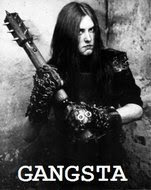Movie Review for Choke
Now that we've got that out of the way, let's try to analyse this thing for what it is: a movie. Victor Mancini (Sam Rockwell) is a sex-addict and works as an "historical reenactor" of colonial times. Trying to keep his insane mother (Anjelica Huston) afloat in a sea of batty crones at a nursing home, he grows a strange, asexual attraction for her doctor, Paige Marshall (Kelly Macdonald). Meanwhile, he, along with his compulsive-masturbating friend, Denny (Brad William Henke), go to restaurants to purposely choke himself on giant slabs of flounder or handfuls of Ethiopian food and find someone in the horrified crowd who is self-righteous and Christ-like enough to Heimlich the hell out of him. Out of this, he receives a constant stream of birthday cards, pity letters, and the occasional 100 bucks, a scam worth jotting down those of us whom lack consciences.
I like to think of Choke, and for that matter many of Chuck Palahniuk's stories, as being like a nice, thick soup. While other movies are celephane-wrapped and come in sugar-coated, homogenous, bite-sized peices, Choke is simply a brothy muck that hides its contents and surprises you with something new in every spoonful. Sometimes that's a good thing, sometimes it's a bad thing. In this case, I think it's a mixture of both. While it's refreshing to see a movie that doesn't masturbate to a marketable movie premise for two hours, I sometimes felt as though the movie itself was a little too disjointed and fragmented. It was noticeable how certain peices of it that were cohesive and well organized in the book didn't translate perfectly into the time constraints of a movie. For instance, a particularly significant aspect of the storyarch was a stone structure that Victor's friend, Denny, was building. In the book it was of extreme importance, but in the movie it seemed to be a hastily mentioned afterthought.
One thing this movie is definitely guilty of is being too faithful to the book. I think the movie-makers overcompensated in their valiant attempts to adapt this onto the silver screen. Maybe there was too much pressure to do the book justice, or maybe they wanted to out do the book itself; either way, I wasn't wholly satisfied with the way in which the scenes were strewn together. While many movies suffer from a haphazard, slapdash editing team, it seems that this editing team was hired straight out of an OCD psych-ward. Scene-after-scene, as the so-called "tension" kept mounting, I kept wondering why, of all the chapters and events in the book, it was these that they chose to depict. What's worse is what divergences did exist were not the things left out but rather the things added in to the story. Granted, these additional jaunts were in themselves funny and creative, but contributed absolutely nothing to the story and seemed like trifling tidbits sprinkled on afterwards. I couldn't help but feel like I had just gotten beaten over the head for two hours with a bag full of pointlessness after walking out of the theater.
What this really boils down to is whether or not this stands alone as a movie. I'm afraid that this is one question I can't answer. Maybe somewhere down the line I'll rent this movie, after I've long forgotten the underpinnings of the novel and see it in a new light; but until then, this seems to me to be a miss--however, a glancing miss that barely passed its target. It was a movie that dutifully provided all the content of the book without any of the context, which is almost as--if not more--important. Chuck Palahniuk is a rhythm writer; he repeats certain phrases and sayings throughout the book because in the end they all add up to something. I'm afraid this sort of rhythm wasn't properly captured on film this time around. As a result, the whole never equalled the sum of its parts.




